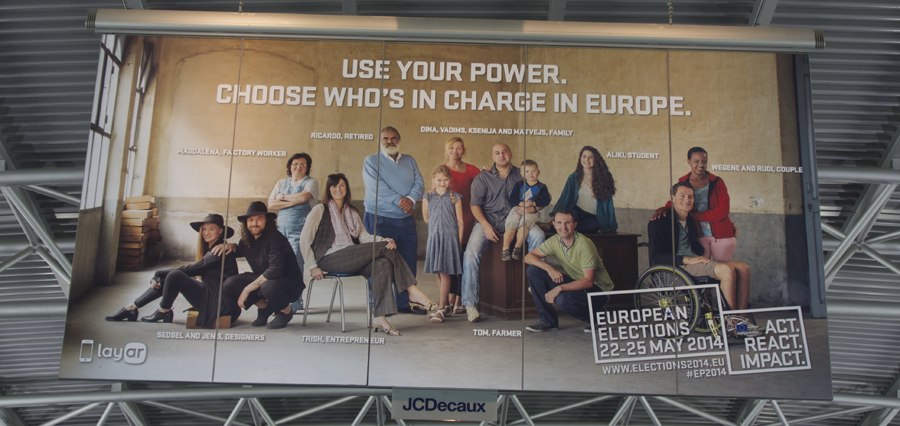When you see them all lined up in a row, staring out at you with faces of cheer and goodwill, the pressure to identify with them is strong. To identify with them as Europeans. To identify with Europe. And that’s surely the point behind this ad campaign, because the bureaucrats in Brussels and Strasbourg who signed off on it need to cultivate a sense of continental belonging.
But pressure has a way of finding different outlets from the ones that engineers intend, whether their specialty be the building of dams or the building of political blocs. Even if the vast majority of force gets channeled exactly where it’s supposed to be, the possibility that some of it will end up somewhere else is a constant concern.
This means that the social engineering to which this EU campaign aspires must be submitted to rigorous analysis, without prejudice, testing its potential weak points. We have to pay special attention to the ways in which it can be read against the grain: as a tale, to paraphrase The Communist Manifesto, of a specter haunting the Europe that had believed, in the wake of the Eastern Bloc’s implosion, that it might finally have a chance to clear up its problems once and for all.
That’s the future Jürgen Habermas has in mind when he implores us to continue the “unfinished project of Enlightenment.” But it’s looking more and more like a future past. Because the clearing up being most frequently advocated these days isn’t targeted at superstitions and prejudices that linger from a darker age but the very peoples who suffered their effects.
Within the context of the xenophobic populism resurgent throughout the continent, but particularly in its most economically challenged corners, the ad campaign’s vision of supra-national belonging comes off as a threat: “See this interracial couple? See these arty hipsters in matching hats? See this sexy woman who is likely to remain a “student” indefinitely because there’s no place for her in the workforce? See this family with names so confusing to speakers of English and French? If you don’t get off your ass and vote, they will take Europe away from you!”
Other posters in the ad campaign reinforce this sort of counter-reading. Consider the one singling out that same student, whose name Aliki marks her as Greek, a citizen of the nation most screwed by the continent’s financial troubles: “This May, Aliki will choose who’s in charge in Europe. And you?” Given its source, the intent of this exhortation is clear: to get prospective voters to exercise their democratic right, taking their role as citizens of Europe as seriously as their role as citizens of France, Portugal or the Czech Republic.
But what the poster actually communicates is far more ambiguous. Because it’s just as easy to read it as a statement of disenfranchisement, implying that if Aliki — and the demographic she metonymically represents — is choosing who’s in charge, then the second person being addressed here is not. From this perspective, the question can be taken as a call to arms, the contemporary equivalent of totalitarian propaganda.
In places where the ideology of multiculturalism has been entrenched for decades, like Canada, Australia or the United States, this sort of misinterpretation would be less likely to gain traction. Europe, however, is another matter. For a variety of reasons, both long-standing and recent, the belief that belonging is a function of blood has proven far more resilient there. To be sure, cosmopolitan cities like London and Paris are monuments to the power of post-genetic identity. But in the continent’s lesser cities and its rural hinterlands, difference is still regarded with deep suspicion.
That’s why we have to question the decision to promote voting with this particular ad campaign. No matter how well-intentioned its creators, the risk that it could do more harm than good is disturbingly high. While a more abstract exhortation, one that leaves more to the reader’s imagination, might seem like a cop out, it would have a better chance of reaching the more intransigent Euro-skeptics on the right. Because, whatever the danger in their doing well in the European elections, it would pale before the prospect of millions concluding that supra-national democracy excludes them by default.
Commentary by Charlie Bertsch; photographs by Joel Schalit.







